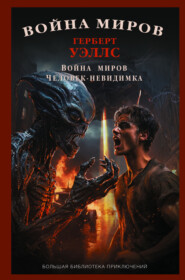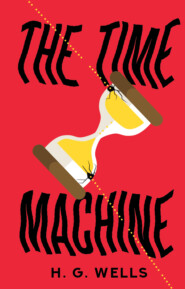По всем вопросам обращайтесь на: info@litportal.ru
(©) 2003-2024.
✖
The Country of the Blind, and Other Stories
Настройки чтения
Размер шрифта
Высота строк
Поля
As they came out of the labyrinth of clinker-heaps and mounds of coal and ore, the noises of the rolling-mill sprang upon them suddenly, loud, near, and distinct. Three shadowy workmen went by and touched their caps to Horrocks. Their faces were vague in the darkness. Raut felt a futile impulse to address them, and before he could frame his words they passed into the shadows. Horrocks pointed to the canal close before them now: a weird-looking place it seemed, in the blood-red reflections of the furnaces. The hot water that cooled the tuyères came into it, some fifty yards up – a tumultuous, almost boiling affluent, and the steam rose up from the water in silent white wisps and streaks, wrapping damply about them, an incessant succession of ghosts coming up from the black and red eddies, a white uprising that made the head swim. The shining black tower of the larger blast-furnace rose overhead out of the mist, and its tumultuous riot filled their ears. Raut kept away from the edge of the water, and watched Horrocks.
"Here it is red," said Horrocks, "blood-red vapour as red and hot as sin; but yonder there, where the moonlight falls on it, and it drives across the clinker-heaps, it is as white as death."
Raut turned his head for a moment, and then came back hastily to his watch on Horrocks. "Come along to the rolling-mills," said Horrocks. The threatening hold was not so evident that time, and Raut felt a little reassured. But all the same, what on earth did Horrocks mean about "white as death" and "red as sin"? Coincidence, perhaps?
They went and stood behind the puddlers for a little while, and then through the rolling-mills, where amidst an incessant din the deliberate steam-hammer beat the juice out of the succulent iron, and black, half-naked Titans rushed the plastic bars, like hot sealing-wax, between the wheels, "Come on," said Horrocks in Raut's ear; and they went and peeped through the little glass hole behind the tuyères, and saw the tumbled fire writhing in the pit of the blast-furnace. It left one eye blinded for a while. Then, with green and blue patches dancing across the dark, they went to the lift by which the trucks of ore and fuel and lime were raised to the top of the big cylinder.
And out upon the narrow rail that overhung the furnace Raut's doubts came upon him again. Was it wise to be here? If Horrocks did know – everything! Do what he would, he could not resist a violent trembling. Right under foot was a sheer depth of seventy feet. It was a dangerous place. They pushed by a truck of fuel to get to the railing that crowned the thing. The reek of the furnace, a sulphurous vapour streaked with pungent bitterness, seemed to make the distant hillside of Hanley quiver. The moon was riding out now from among a drift of clouds, half-way up the sky above the undulating wooded outlines of Newcastle. The steaming canal ran away from below them under an indistinct bridge, and vanished into the dim haze of the flat fields towards Burslem.
"That's the cone I've been telling you of," shouted Horrocks; "and, below that, sixty feet of fire and molten metal, with the air of the blast frothing through it like gas in soda-water."
Raut gripped the hand-rail tightly, and stared down at the cone. The heat was intense. The boiling of the iron and the tumult of the blast made a thunderous accompaniment to Horrocks's voice. But the thing had to be gone through now. Perhaps, after all…
"In the middle," bawled Horrocks, "temperature near a thousand degrees. If you were dropped into it … flash into flame like a pinch of gunpowder in a candle. Put your hand out and feel the heat of his breath. Why, even up here I've seen the rain-water boiling off the trucks. And that cone there. It's a damned sight too hot for roasting cakes. The top side of it's three hundred degrees."
"Three hundred degrees!" said Raut.
"Three hundred centigrade, mind!" said Horrocks. "It will boil the blood out of you in no time."
"Eigh?" said Raut, and turned.
"Boil the blood out of you in … No, you don't!"
"Let me go!" screamed Raut. "Let go my arm!"
With one hand he clutched at the hand-rail, then with both. For a moment the two men stood swaying. Then suddenly, with a violent jerk, Horrocks had twisted him from his hold. He clutched at Horrocks and missed, his foot went back into empty air; in mid-air he twisted himself, and then cheek and shoulder and knee struck the hot cone together.
He clutched the chain by which the cone hung, and the thing sank an infinitesimal amount as he struck it. A circle of glowing red appeared about him, and a tongue of flame, released from the chaos within, flickered up towards him. An intense pain assailed him at the knees, and he could smell the singeing of his hands. He raised himself to his feet, and tried to climb up the chain, and then something struck his head. Black and shining with the moonlight, the throat of the furnace rose about him.
Horrocks, he saw, stood above him by one of the trucks of fuel on the rail. The gesticulating figure was bright and white in the moonlight, and shouting, "Fizzle, you fool! Fizzle, you hunter of women! You hot-blooded hound! Boil! boil! boil!"
Suddenly he caught up a handful of coal out of the truck, and flung it deliberately, lump after lump, at Raut.
"Horrocks!" cried Raut. "Horrocks!"
He clung, crying, to the chain, pulling himself up from the burning of the cone. Each missile Horrocks flung hit him. His clothes charred and glowed, and as he struggled the cone dropped, and a rush of hot, suffocating gas whooped out and burned round him in a swift breath of flame.
His human likeness departed from him. When the momentary red had passed, Horrocks saw a charred, blackened figure, its head streaked with blood, still clutching and fumbling with the chain, and writhing in agony – a cindery animal, an inhuman, monstrous creature that began a sobbing, intermittent shriek.
Abruptly at the sight the ironmaster's anger passed. A deadly sickness came upon him. The heavy odour of burning flesh came drifting up to his nostrils. His sanity returned to him.
"God have mercy upon me!" he cried. "O God! what have I done?"
He knew the thing below him, save that it still moved and felt, was already a dead man – that the blood of the poor wretch must be boiling in his veins. An intense realisation of that agony came to his mind, and overcame every other feeling. For a moment he stood irresolute, and then, turning to the truck, he hastily tilted its contents upon the struggling thing that had once been a man. The mass fell with a thud, and went radiating over the cone. With the thud the shriek ended, and a boiling confusion of smoke, dust, and flame came rushing up towards him. As it passed, he saw the cone clear again.
Then he staggered back, and stood trembling, clinging to the rail with both hands. His lips moved, but no words came to them.
Down below was the sound of voices and running steps. The clangour of rolling in the shed ceased abruptly.
III.
THE STOLEN BACILLUS
"This again," said the Bacteriologist, slipping a glass slide under the microscope, "is well, – a preparation of the Bacillus of cholera – the cholera germ."
The pale-faced man peered down the microscope. He was evidently not accustomed to that kind of thing, and held a limp white hand over his disengaged eye. "I see very little," he said.
"Touch this screw," said the Bacteriologist; "perhaps the microscope is out of focus for you. Eyes vary so much. Just the fraction of a turn this way or that."
"Ah! now I see," said the visitor. "Not so very much to see after all. Little streaks and shreds of pink. And yet those little particles, those mere atomies, might multiply and devastate a city! Wonderful!"
He stood up, and releasing the glass slip from the microscope, held it in his hand towards the window. "Scarcely visible," he said, scrutinising the preparation. He hesitated. "Are these – alive? Are they dangerous now?"
"Those have been stained and killed," said the Bacteriologist. "I wish, for my own part, we could kill and stain every one of them in the universe."
"I suppose," the pale man said, with a slight smile, 'that you scarcely care to have such things about you in the living – in the active state?"
"On the contrary, we are obliged to," said the Bacteriologist. "Here, for instance – " He walked across the room and took up one of several sealed tubes. "Here is the living thing. This is a cultivation of the actual living disease bacteria." He hesitated. "Bottled cholera, so to speak."
A slight gleam of satisfaction appeared momentarily in the face of the pale man. "It's a deadly thing to have in your possession," he said, devouring the little tube with his eyes. The Bacteriologist watched the morbid pleasure in his visitor's expression. This man, who had visited him that afternoon with a note of introduction from an old friend, interested him from the very contrast of their dispositions. The lank black hair and deep grey eyes, the haggard expression and nervous manner, the fitful yet keen interest of his visitor were a novel change from the phlegmatic deliberations of the ordinary scientific worker with whom the Bacteriologist chiefly associated. It was perhaps natural, with a hearer evidently so impressionable to the lethal nature of; his topic, to take the most effective aspect of the matter.
He held the tube in his hand thoughtfully. "Yes, here is the pestilence imprisoned. Only break such a little tube as this into a supply of drinking-water, say to these minute particles of life that one must needs stain and examine with the highest powers of the microscope even to see, and that one can neither smell nor taste – say to them, 'Go forth, increase and multiply, and replenish the cisterns,' and death – mysterious, untraceable death, death swift and terrible, death full of pain and indignity – would be released upon this city, and go hither and thither seeking his victims. Here he would take the husband from the wife, here the child from its mother, here the statesman from his duty, and here the toiler from his trouble. He would follow the water-mains, creeping along streets, picking out and punishing a house here and a house there where they did not boil their drinking-water, creeping into the wells of the mineral water makers, getting washed into salad, and lying dormant in ices. He would wait ready to be drunk in the horse-troughs, and by unwary children in the public fountains. He would soak into the soil, to reappear in springs and wells at a thousand unexpected places. Once start him at the water supply, and before we could ring him in, and catch him again, he would have decimated the metropolis."
He stopped abruptly. He had been told rhetoric was his weakness.
"But he is quite safe here, you know – quite safe."
The pale-faced man nodded. His eyes shone. He cleared his throat. "These Anarchist – rascals," said he, "are fools, blind fools – to use bombs when this kind of thing is attainable. I think – "
A gentle rap, a mere light touch of the finger-nails, was heard at the door. The Bacteriologist opened if. "Just a minute, dear," whispered his wife.
When he re-entered the laboratory his visitor was looking at his watch. "I had no idea I had wasted an hour of your time," he said. "Twelve minutes to four. I ought to have left here by half-past three. But your things were really too interesting. No, positively I cannot stop a moment longer. I have an engagement at four."
He passed out of the room reiterating his thanks, and the Bacteriologist accompanied him to the door, and then returned thoughtfully along the passage to his laboratory. He was musing on the ethnology of his visitor. Certainly the man was not a Teutonic type nor a common Latin one. "A morbid product, anyhow, I am afraid," said the Bacteriologist to himself. "How he gloated over those cultivations of disease germs!" A disturbing thought struck him. He turned to the bench by the vapour bath, and then very quickly to his writing-table. Then he felt hastily in his pockets and then rushed to the door. "I may have put it down on the hall table," he said.
"Minnie!" he shouted hoarsely in the hall.
"Yes, dear," came a remote voice.
"Had I anything in my hand when I spoke to you, dear, just now?"
Pause.
"Nothing, dear, because I remember – "
"Blue ruin!" cried the Bacteriologist, and incontinently ran to the front door and down the steps of his house to the street.
Minnie, hearing the door slam violently, ran in alarm to the window. Down the street a slender man was getting into a cab. The Bacteriologist, hatless, and in his carpet slippers, was running and gesticulating wildly towards this group. One slipper came off, but he did not wait for it. "He has gone mad!" said Minnie; "it's that horrid science of his"; and, opening the window, would have called after him. The slender man, suddenly glancing round, seemed struck with the same idea of mental disorder. He pointed hastily to the Bacteriologist, said something to the cabman, the apron of the cab slammed, the whip swished, the horse's feet clattered, and in a moment cab and Bacteriologist hotly in pursuit, had receded up the vista of the roadway and disappeared round the corner.

















